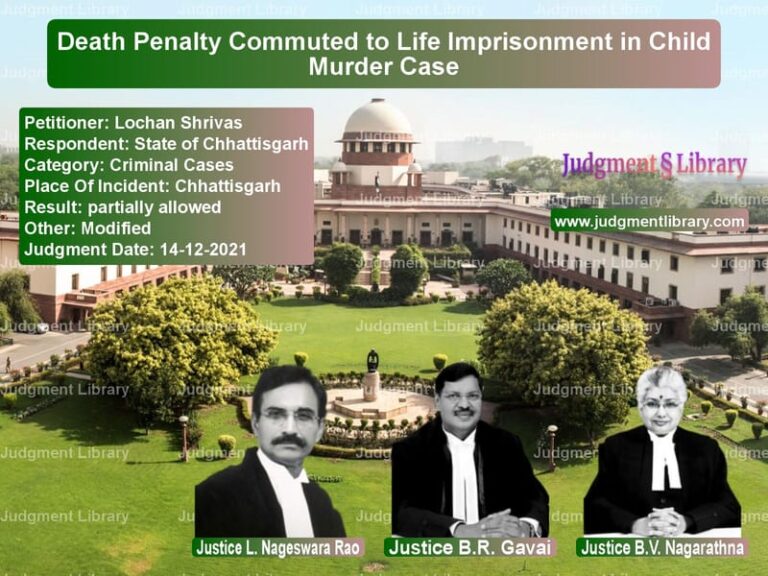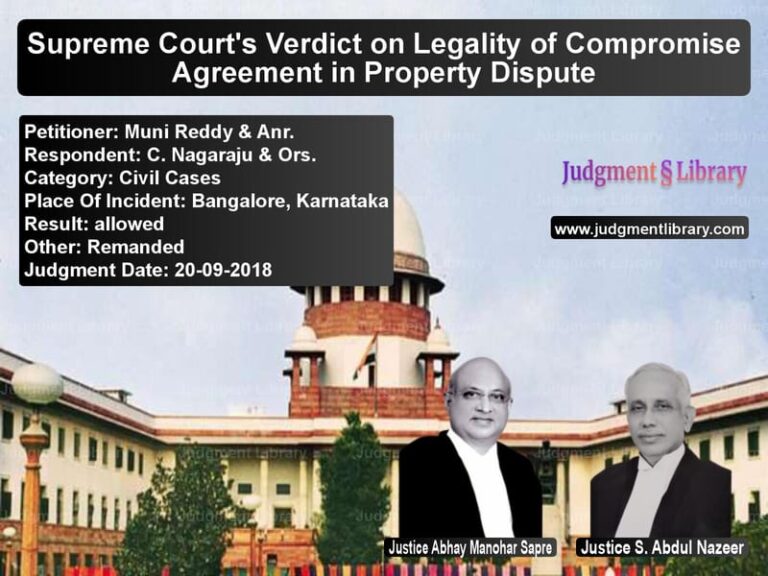Punjab Land Auction Dispute: Supreme Court Rules on Property Sale Cancellation
The case of State of Punjab vs. Mehar Din revolves around a public auction of land that was later canceled by the government due to concerns over inadequate publicity and an unfair bidding process. The Supreme Court examined whether the cancellation of the highest bid was justified and whether the bidder had a vested right in the auctioned property.
This judgment clarifies key principles regarding public auctions, the discretion of government authorities, and the limited scope of judicial review in contract and property matters.
Background of the Case
The dispute arose from an auction of sub-urban land conducted under the Punjab Package Deal Properties (Disposal) Rules, 1976. The government, as the custodian of the property, initiated the process for public auction, and a notice was published in the Punjabi Tribune on May 17, 1993, announcing the auction to be held on June 4, 1993. The land in question was situated in Malerkotla.
The auction was conducted as per the rules, and the highest bid of Rs. 3,90,000 was placed by Mehar Din. He deposited 1/5th of the bid amount (Rs. 78,000) on the spot. However, as per the auction terms, the bid was subject to confirmation by the Sales Commissioner.
Upon review, the Sales Commissioner found that:
- The auction lacked adequate publicity.
- Only three bidders participated in the process.
- The bid price appeared to be too low compared to the market rate.
Based on these findings, the Sales Commissioner canceled the auction on July 2, 1993 and ordered a re-auction with wider publicity. The bidder, Mehar Din, challenged this decision in multiple legal forums.
Legal Proceedings Before the High Court
The cancellation of the auction was first upheld by the Chief Sales Commissioner on October 24, 1994. However, in an appeal filed by Mehar Din, the Divisional Commissioner reversed the decision on September 17, 2003, holding that the auction was conducted fairly and should be confirmed.
The government then challenged this order before the Financial Commissioner, Revenue, Punjab, who reinstated the cancellation of the auction on August 24, 2006. The Financial Commissioner emphasized that:
- There were only three participants in the bidding process.
- The sale price of Rs. 3,90,000 was significantly lower than market expectations.
- The land should be re-auctioned to ensure maximum revenue.
Mehar Din then filed a writ petition before the Punjab and Haryana High Court, which set aside the Financial Commissioner’s decision on August 13, 2008, directing the government to confirm the sale and complete all formalities.
Arguments of the Petitioner (State of Punjab)
The government, through its counsel, contended that:
- The Sales Commissioner had the authority to cancel an auction if it was not conducted fairly.
- As per Rule 8(1)(h) of the 1976 Rules, the highest bid was only provisional and required confirmation.
- The limited participation in the auction indicated possible collusion, justifying a re-auction.
- The High Court had exceeded its jurisdiction by interfering with the executive’s discretion.
Arguments of the Respondent (Mehar Din)
The respondent argued that:
- The auction was conducted legally, and he was the highest bidder.
- The government had not provided evidence that the land’s actual market value was higher than his bid.
- There was no procedural irregularity to justify canceling the auction.
- The High Court was correct in directing the confirmation of the sale.
Supreme Court’s Observations
The Supreme Court, comprising Justices Ajay Rastogi and Abhay S. Oka, carefully analyzed the auction process and government rules regarding property disposal.
The Court made the following key observations:
- The highest bid in a public auction is always subject to confirmation, and no vested right is created in favor of the highest bidder.
- The Sales Commissioner had valid reasons to believe that the auction did not receive adequate participation.
- Rule 8 of the Punjab Package Deal Properties (Disposal) Rules, 1976 allows the government to re-auction land if necessary to secure the best price.
- Judicial review in contractual and auction matters is limited to checking arbitrariness and procedural violations, not substituting the government’s discretion with court opinions.
The Court also cited the landmark case of Tata Cellular v. Union of India (1994), which established that courts should not interfere in contract matters unless there is irrationality, bias, or malafide intent.
Read also: https://judgmentlibrary.com/supreme-court-rules-on-land-ownership-dispute-in-mumbai-case-analysis/
Supreme Court’s Verdict
On March 2, 2022, the Supreme Court ruled:
- The High Court had overstepped its jurisdiction by directing the confirmation of the sale.
- The Sales Commissioner acted within his authority in canceling the auction.
- The Financial Commissioner’s decision to re-auction the land was valid.
- The government was ordered to refund the respondent’s earnest money of Rs. 78,000 with 12% interest per annum.
The Court concluded:
“The highest bidder in an auction does not acquire any vested right unless the bid is confirmed by the competent authority. The interference by the High Court was unwarranted.”
Conclusion
This ruling reinforces the principle that public auctions must be conducted transparently and in a manner that ensures maximum public benefit. The judgment clarifies that:
- Government authorities have the right to cancel an auction if they find valid reasons for doing so.
- The highest bidder does not automatically acquire ownership rights.
- Courts should refrain from interfering in administrative decisions unless there is clear evidence of procedural impropriety.
The Supreme Court’s decision upholds the discretion of government bodies to ensure fair and competitive bidding in public auctions.
Petitioner Name: State of Punjab.Respondent Name: Mehar Din.Judgment By: Justice Ajay Rastogi, Justice Abhay S. Oka.Place Of Incident: Malerkotla, Punjab.Judgment Date: 02-03-2022.
Don’t miss out on the full details! Download the complete judgment in PDF format below and gain valuable insights instantly!
Download Judgment: state-of-punjab-vs-mehar-din-supreme-court-of-india-judgment-dated-02-03-2022.pdf
Directly Download Judgment: Directly download this Judgment
See all petitions in Property Disputes
See all petitions in Damages and Compensation
See all petitions in Contract Disputes
See all petitions in Landlord-Tenant Disputes
See all petitions in Judgment by Ajay Rastogi
See all petitions in Judgment by Abhay S. Oka
See all petitions in allowed
See all petitions in Quashed
See all petitions in supreme court of India judgments March 2022
See all petitions in 2022 judgments
See all posts in Civil Cases Category
See all allowed petitions in Civil Cases Category
See all Dismissed petitions in Civil Cases Category
See all partially allowed petitions in Civil Cases Category







